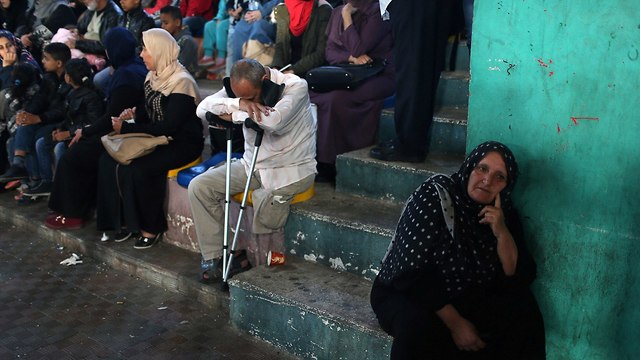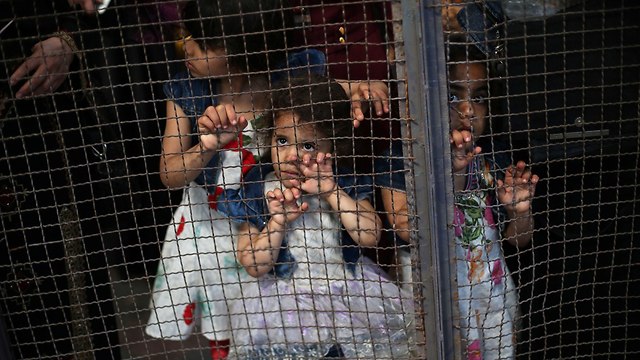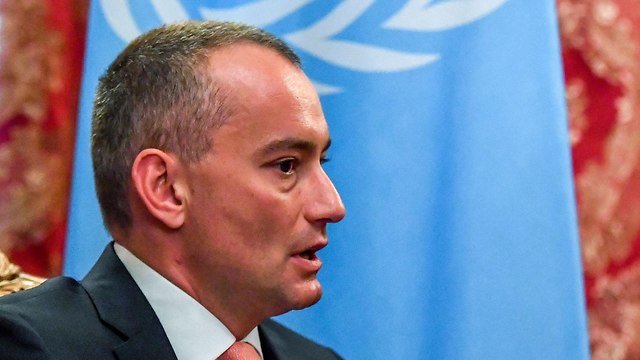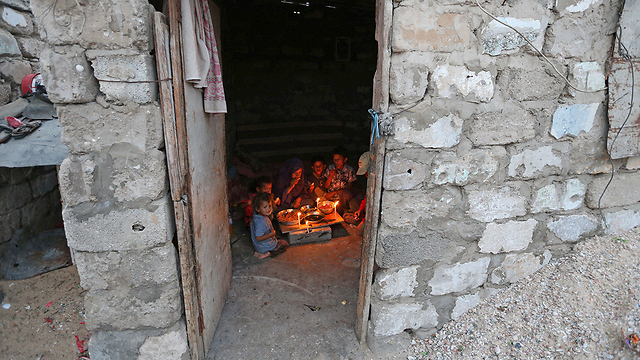Proposals under discussion include giving 6,000 Gazans work permits in Israel, bringing goods through the Erez crossing and connecting it to the Ashdod port, thus giving the strip a sea port, and a series of relief measures.
The Security Cabinet will discuss the humanitarian situation in the Gaza Strip on Sunday.
The proposals under discussion will include allowing 6,000 Gazans into Israel to work, turning the Erez crossing into a goods and supply crossing and linking it to the Ashdod port, and various relief measures.
Gaza workers haven’t been allowed into Israel since 2007. The Shin Bet opposes the move, which is the result of administrative work done by Deputy Minister Michael Oren at the behest of Prime Minister Benjamin Netanyahu, but it has some support in the IDF.

Oren’s proposal to open the Erez crossing for goods and supplies and connect it to the Ashdod port via railway is meant to provide a sea port for the Gaza Strip. Oren believes this plan is far more practical and cheap than Minister Yisrael Katz’s island sea port plan, which Cabinet members are also expected to discuss.
Other proposals on the agenda concern relief measures for the Palestinians formulated by the Coordinator for Government Activities in the Territories (COGAT). He recently allowed 500 Israeli Arab businessmen to enter Gaza, which gave a serious boost to the shaky Palestinian economy.
The discussion on the humanitarian situation in Gaza, the first in a very long time, comes after Netanyahu told German Chancellor Angela Merkel in their recent meeting in Berlin that Israel was examining possibilities to prevent a humanitarian collapse in the strip.

The humanitarian crisis in the strip has been exacerbated by the Trump administration’s decision to cut half of the aid money it gives UNRWA—the United Nations Relief and Works Agency for Palestine Refugees in the Near East. This raised concerns the agency—which provides salaries to 13,000 employees in the Gaza Strip, making it the second largest employer after the Palestinian Authority—would collapse.The humanitarian crisis in the strip has been exacerbated by the Trump administration’s decision to cut half of the aid money it gives UNRWA—the United Nations Relief and Works Agency for Palestine Refugees in the Near East. This raised concerns the agency—which provides salaries to 13,000 employees in the Gaza Strip, making it the second largest employer after the Palestinian Authority—would collapse.
In addition, a possible collapse of UNRWA’s schools in the strip would have hurt some 200,000 children in different ages.
This would have been a serious blow the strip would not have been able to recover from, but thanks to efforts by UN Special Coordinator for the Middle East Nickolay Mladenov and others, the international community stepped in to raise the funds the US cut, filling UNRWA’s coffers until the end of the year. The UN envoy is also working to ensure UNRWA’s funding for next year.

Mladenov was able to achieve this significant breakthrough without having to involve the two-headed Palestinian leadership—Hamas in Gaza, which tries to funnel every dollar coming into the strip for terrorism and for building up its military strength, and Palestinian President Mahmoud Abbas, who won’t pay salaries to Palestinian Authority employees in Gaza or take responsibility for its rehabilitation.Mladenov was able to achieve this significant breakthrough without having to involve the two-headed Palestinian leadership—Hamas in Gaza, which tries to funnel every dollar coming into the strip for terrorism and for building up its military strength, and Palestinian President Mahmoud Abbas, who won’t pay salaries to Palestinian Authority employees in Gaza or take responsibility for its rehabilitation.
Another problem is a severe shortage of cash in the Gaza Strip. After the failure of the latest reconciliation effort between Fatah and Hamas, Abbas demanded control over the security services in the strip in return for also taking over civil responsibility over Gaza and its rehabilitation.
Hamas refused, and Abbas imposed sanctions on the terror group. At present, only 40 percent of April’s salaries have been transferred to the strip. Abbas also cut the funds for electricity, which leads to power shortages in the strip, with Gazans getting electricity only four hours a day.

In addition, the contamination of the water in Gaza, faulty handling of sewage treatment and poor sanitation conditions, as well as a 50 percent unemployment rate (70 percent among young people)—all add up.In addition, the contamination of the water in Gaza, faulty handling of sewage treatment and poor sanitation conditions, as well as a 50 percent unemployment rate (70 percent among young people)—all add up.
Among the countries that agreed to donate significant sums to Gaza were Qatar, the United Arab Emirates and other Sunni nations.
Sources who spoke to Mladenov said the funds would be put in a kind of trust fund, into which the different nations could transfer money to finance different projects in the strip, including housing projects, upgrades to the electrical grid and gas pipelines, the construction of water desalination facilities and sewage treatment facilities, and more. One project being secretly advanced is the construction of a power plant in Sinai that would provide electricity from Egypt, thus cutting Gaza from its dependency on Israel for power.
Working in conjunction with the Egyptians and the civil authorities in Gaza, Mladenov also formulated a plan to create jobs in the strip to help reduce the high unemployment rate, particularly among young people. This would be a short-term solution until the bigger projects begin advancing, thus creating even more jobs.
Egypt has also agreed to open the Rafah border crossing throughout the entire month of Ramadan, allowing Palestinians to exit the densely populated small enclave. Israel played a significant part in convincing the Egyptians to do so.
Because Mladenov did not need to reach any agreements or understandings with Hamas to establish this aid mechanism, the terror group would not be able to funnel money out of it, and it could lead to significant improvement of life in Gaza.
Mladenov and other elements in the Arab world are also pressuring Abbas to transfer all of the salaries for employees in the strip, to alleviate the cash shortage.
As reported by Ynetnews
